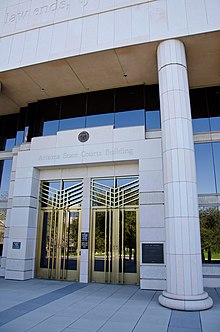Arizona Supreme Court
| Arizona Supreme Court | |
|---|---|
 Seal of the Arizona Supreme Court | |
| Established | 1912 |
| Location | Phoenix, Arizona |
| Composition method | Missouri plan with retention elections |
| Authorized by | Arizona Constitution |
| Appeals to | Supreme Court of the United States |
| Judge term length | 6 years |
| Number of positions | 7 |
| Website | Official site |
| Chief Justice | |
| Currently | Robert M. Brutinel |
| Since | July 1, 2019 |
The Arizona Supreme Court is the state supreme court of the U.S. state of Arizona. Sitting in the Supreme Court building in downtown Phoenix, the court consists of a chief justice, a vice chief justice, and five associate justices. Each justice is appointed by the governor of Arizona from a list recommended by a bipartisan commission. Justices stand for retention in an election two years after their appointment and then every six years.[1] They must retire at age 70.
Court history[]
The court started in 1912 with 3 justices. Alfred Franklin, Donald L. Cunningham, and Henry D. Ross took office on February 14, 1912 (Valentine's Day). In 1949, the Court expanded from 3 to 5 justices and from 5 to 7 justices in 2016.[2][3]
The jurisdiction of the court is prescribed by Article VI, Section 5 of the Arizona Constitution.[4] Most of the appeals heard by the court go through the Arizona Court of Appeals, except for death penalty cases, over which the Arizona Supreme Court has sole appellate jurisdiction. The court also has original jurisdiction in a few other circumstances as outlined in the Arizona Constitution. A quorum is three, but the whole court must sit in order to declare a law unconstitutional.[5]
Selection of justices[]

The Chief Justice is chosen for a five-year term by the court, and is eligible for re-election. They supervise the administration of all the inferior courts. They are Chairman of the Commission on Appellate Court Appointments, which nominates candidates to fill vacancies in the appellate courts. If the Governor fails to appoint one of the nominated candidates within sixty days of their names being submitted to her or him, the Chief Justice makes the appointment.
The Vice Chief Justice, who acts as Chief Justice in the latter's "absence or incapacity," is chosen by the court for a term determined by the court.[6]
Justices are selected by a modified form of the Missouri Plan. A bipartisan commission considers applicants and sends a list of nominees to the governor. The governor is required by law to appoint from this list based on merit, without regard to party affiliation. Justices are then retained for an initial period, after which they are subject to a retention election. If the justice wins the election, his/her term is six years.
Qualifications[]
- Admitted to the practice of law in Arizona and be a resident of Arizona for the 10 years before taking office;
- May not practice law while a member of the judiciary;
- May not hold any other political office or public employment;
- May not hold office in any political party;
- May not campaign, except for him/herself; and,
- Must retire at age 70.[7]
Justices[]
The current Arizona Supreme Court includes:
| Justice | Born | Appointment | Mandatory retirement | Law school | Appointed by |
|---|---|---|---|---|---|
| Robert M. Brutinel, Chief Justice | March 18, 1958 | November 10, 2010 (as Associate Justice) July 1, 2019 (as Chief) |
2028 | Arizona | Jan Brewer (R) |
| Ann Timmer, Vice Chief Justice | September 12, 1960 | October 12, 2012 | 2030 | Arizona State | Jan Brewer (R) |
| Clint Bolick | December 26, 1957 | January 6, 2016 | 2027 | UC Davis | Doug Ducey (R) |
| John Lopez IV | 1968 (age 52–53) | December 19, 2016 | 2039 | Arizona State | Doug Ducey (R) |
| James Beene | 1965 (age 55–56) | April 26, 2019 | 2034/2035 | Arizona | Doug Ducey (R) |
| Bill Montgomery | March 2, 1967 | September 6, 2019 | 2037 | Arizona State | Doug Ducey (R) |
| Kathryn Hackett King | n/a | July 8, 2021 | n/a | Arizona | Doug Ducey (R) |
Chief Justices[]
- Alfred Franklin (1912–1914, 1917)
- Henry D. Ross (1915–1916, 1921–1922, 1927–1928, 1933–1934, 1939–1940, 1945)
- Donald L. Cunningham (1918–1920)
- Archibald G. McAlister (1923–1926, 1931–1932, 1937–1938, 1943–1944)
- Alfred C. Lockwood (1929–1930, 1935–1936, 1941–1942)
- Rawghlie Clement Stanford (1945–1948)
- Arthur T. LaPrade (1949–1950, 1955–1956)
- Levi Stewart Udall (1951–1952)
- Rawghlie Clement Stanford (1953–1953)
- Marlin T. Phelps (1954–1954, 1959)
- Levi Stewart Udall (1957–1958)
- Fred C. Struckmeyer Jr. (1960–1961, 1966, 1971, 1980–1981)
- Charles C. Bernstein (1962–1963, 1967–1967)
- Jesse Addison Udall (1964–1964, 1969)
- Lorna E. Lockwood (1965–1965, 1970) (First female chief justice in the United States)
- Ernest McFarland (1968–1968)
- Jack D. H. Hays (1972–1974)
- James Duke Cameron (1975–1979)
- William A. Holohan (1982–1987)
- Frank Gordon Jr. (1987–1992)
- Stanley G. Feldman (1992–1997)
- Thomas A. Zlaket (1997–2002)
- Charles E. Jones (2002–2005)
- Ruth McGregor (2005–2009)
- Rebecca White Berch (2009–2014)
- Scott Bales (2014–2019)
- Robert M. Brutinel (2019–present)
See also[]
References[]
- ^ "Format Document".
- ^ William O. Douglas, Arizona's New Judicial Article, 2 ARIZ. L. REV. 159 (1960).
- ^ http://kjzz.org/content/269920/bill-would-add-2-new-justices-arizona-supreme-court
- ^ "Article 6 Section 5 - Supreme court; jurisdiction; writs; rules; habeas corpus".
- ^ "Format Document".
- ^ "Format Document".
- ^ http://www.azcourts.gov/AZ-Supreme-Court
External links[]
- Arizona Supreme Court
- State supreme courts of the United States
- 1912 establishments in Arizona
- Courts and tribunals established in 1912
